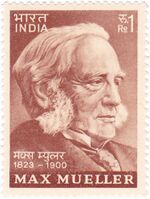Müller, M.: Difference between revisions
No edit summary |
|||
| Line 1: | Line 1: | ||
{{Person | {{Person | ||
|PersonType=Professors; Translators; Authors of English Works; Authors of German Works | |PersonType=Professors; Translators; Authors of English Works; Authors of German Works | ||
|images=File:Friedrich Max Müller 1974 stamp of India.jpg | |||
|MainNamePhon=Friedrich Max Müller | |MainNamePhon=Friedrich Max Müller | ||
|SortName=Max Müller | |SortName=Max Müller | ||
| Line 6: | Line 7: | ||
|yeardeath=1900/10/28 | |yeardeath=1900/10/28 | ||
|bornin=Dessau, Duchy of Anhalt, German Confederation | |bornin=Dessau, Duchy of Anhalt, German Confederation | ||
|bio=Max Müller, in full Friedrich Max Müller, (born Dec. 6, 1823, Dessau, duchy of Anhalt [Germany]—died Oct. 28, 1900, Oxford, Eng.), German scholar of comparative language, religion, and mythology. Müller’s special areas of interest were Sanskrit philology and the religions of India.</br></br> | |||
The son of Wilhelm Müller, a noted poet, Max Müller was educated in Sanskrit, the classical language of India, and other languages in Leipzig, Berlin, and Paris. He moved to England in 1846 and settled in Oxford in 1848, where he became deputy professor of modern languages in 1850. He was appointed professor of comparative philology in 1868 and retired in 1875.</br> | |||
Müller was instrumental in editing and translating into English some of the most ancient and revered religious and philosophical texts of Asia. Especially noteworthy are his edition of the great collection of Sanskrit hymns the Rigveda, Rig-Veda-samhitâ: The Sacred Hymns of the Bráhmans (6 vol., 1849–74); his work as editor of the 51-volume series of translations The Sacred Books of the East; and his initial editing of the series Sacred Books of the Buddhists. In addition, Müller was an important early proponent of a discipline that he called the “science of religion”; indeed, some credit him with founding that field. His most important writings on the subject include Essays on the Science of Religion (1869), vol. 1 of Chips from a German Workshop; Introduction to the Science of Religion (1873); and Lectures on the Origin and Growth of Religion (1878). | |||
[https://www.britannica.com/biography/Max-Muller Source and more details to be found here: ENCYCLOPÆDIA BRITANNICA] | |||
|affiliation=Oxford University | |affiliation=Oxford University | ||
|phduniversity=Leipzig University | |phduniversity=Leipzig University | ||
|languageprimary=German | |||
|languagetranslation=Sanskrit | |languagetranslation=Sanskrit | ||
|IsInGyatsa=No | |IsInGyatsa=No | ||
Revision as of 05:08, 30 July 2020
| PersonType | Category:Professors Category:Translators Category:Authors of English Works Category:Authors of German Works |
|---|---|
| MainNamePhon | Friedrich Max Müller |
| SortName | Max Müller |
| bio | Max Müller, in full Friedrich Max Müller, (born Dec. 6, 1823, Dessau, duchy of Anhalt [Germany]—died Oct. 28, 1900, Oxford, Eng.), German scholar of comparative language, religion, and mythology. Müller’s special areas of interest were Sanskrit philology and the religions of India. The son of Wilhelm Müller, a noted poet, Max Müller was educated in Sanskrit, the classical language of India, and other languages in Leipzig, Berlin, and Paris. He moved to England in 1846 and settled in Oxford in 1848, where he became deputy professor of modern languages in 1850. He was appointed professor of comparative philology in 1868 and retired in 1875. |
| YearBirth | 1823/12/06 |
| YearDeath | 1900/10/28 |
| BornIn | Dessau, Duchy of Anhalt, German Confederation |
| languageprimary | German |
| languagetranslation | Sanskrit |
| affiliation | Oxford University |
| phduniversity | Leipzig University |
| IsInGyatsa | No |
| Other wikis |
If the page does not yet exist on the remote wiki, you can paste the tag |
Full Name
Friedrich Max Müller

